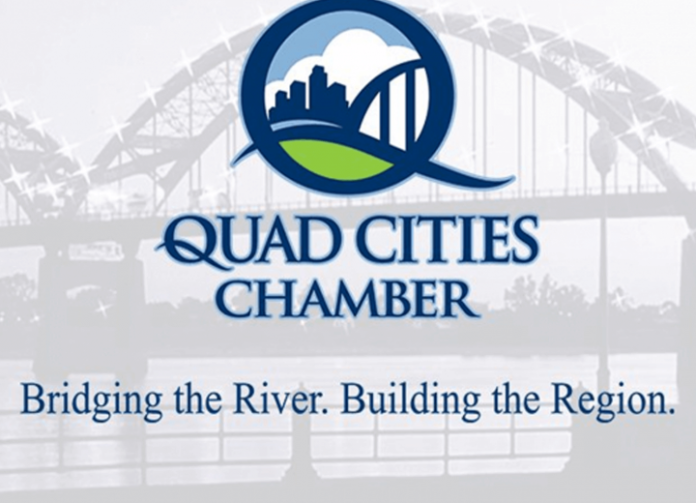
The Quad Cities Chamber shared Tuesday its recipe for growing the region’s population and economy in 2022 that focuses on four key ingredients:
- Talent attraction and development;
- Placemaking;
- Fostering a business-friendly environment;
- COVID-19 economic recovery;
The Chamber’s 2022 Regional Advocacy Priorities for the upcoming congressional and Illinois and Iowa legislative sessions are designed to work in tandem to create a prosperous regional economy where all can thrive, the organization said. They also are aimed at helping achieve the community’s twin goals of growing the region to half a million people and increasing its GDP to more than $35 billion by 2030.
Those long-term targets first were set as part of the region’s 2030 strategic plan. As part of that Q2030 vision, the chamber has set a single advocacy agenda for the region since 2020 rather than identifying separate priorities for Iowa and Illinois.
The legislative priorities list is created from the chamber’s annual survey of members that seeks to identify the top issues and challenges facing regional businesses. The chamber’s government affairs team uses the survey results to create a targeted public policy agenda for the upcoming year’s sessions in Congress and Iowa and Illinois.
Last year, for example, the chamber’s top goals included fostering a regional outlook, COVID-19 recovery, competitive tax policy, economic development, transportation and infrastructure, and workforce development. Only two of those priorities – pandemic recovery and workforce development – were carried forward in the 2022 priorities list announced by Chamber President and CEO Paul Rumler.
“The Quad Cities Chamber is asking state, local and federal elected officials to pursue public policies in 2022 that will position the Quad Cities region for accelerated prosperity and growth,” Mr. Rumler said. “Among many priorities, we’re advocating for solutions to help increase workforce availability and to help our region attract and retain much-needed talent.”
The latter is essential if the Quad Cities is to grow its population and create a skilled workforce that attracts new businesses and ensures current employers have the talent pool to succeed, Mr. Rumler said. Fully funding education and skilled training programs as well as assisting employees in finding affordable housing and child care will build a well-equipped workforce for regional employers, the chamber said.
How can Quad Citians help? “We encourage business and community leaders to get involved by signing up at the Quad Cities Chamber’s Advocacy Action Center to stay up-to-date and add their input on issues as they come forward,” said Jennifer Walker, the chamber’s vice president of marketing and sales.
Workforce development is critical for both population and economic growth, and among the issues the chamber is advocating for are: incentivizing alternative career training pathways that build the workforce and talent pipelines; increasing funding for education from Pre-K to college; supporting criminal justice reforms that provide opportunities for employment; growing the regional workforce; and identifying disparities in public benefit programs that create a cliff-effect and disincentivize job and career development.
“To attract and retain a talented workforce, the region must be a place people and employers want to call home,” the chamber said. “Placemaking leverages the unique assets that define the community to underscore one-of-a-kind opportunities that attract residents, amenities, and businesses.”
To do that, the plan calls for developing a unique, cohesive regional Mississippi riverfront experience for residents and visitors; using existing state programs such as Iowa’s Community Attraction and Tourism grants and Iowa and Illinois’ Main Street and Downtown Capital Program to promote placemaking projects; and working with regional partners to create safe and vibrant downtowns, neighborhoods and business corridors.
In addition to a talented workforce, the chamber said a “distinct sense of place allows the region to attract businesses seeking to expand or move. To guarantee the regional economy is competitive on a national scale, it must forge a healthy business climate that advances the Quad Cities as an employer-friendly destination.”
That means promoting fiscal reforms and tax policies that encourage business to invest in the region; backing government programs, tools and investments that foster economic growth and encourage regional cooperation; protecting programs that attract new business and expansion; developing long-term plans for infrastructure improvements; supporting federal policies that advance the Rock Island Arsenal’s mission; and expanding access to community-wide broadband and fiber connectivity.
Economic recovery from COVID-19 also remains a top chamber priority. As efforts continue to mitigate the disease’s spread, the chamber said it will advocate for policies that will lessen the negative impact on business and provide flexible relief and clear guidance regarding employer responsibilities. That includes ensuring the burden of vaccine mandates and testing is not forced on business, and that companies are not harmed in their efforts to comply with pandemic mandates. For example, the chamber wants to replenish the unemployment trust fund to alleviate the burden on businesses; provide liability protections for employers who follow the established CDC guidelines; and extend the Minimum Wage Credit in Illinois for an additional three years by carrying over each tier of credit for an extra calendar year.




